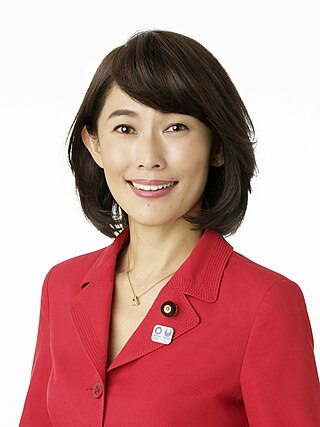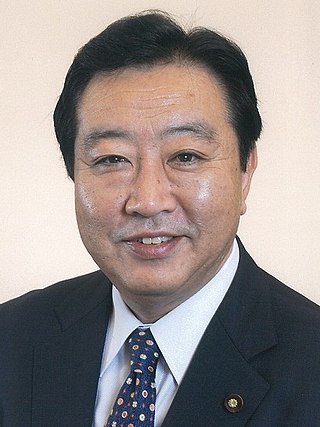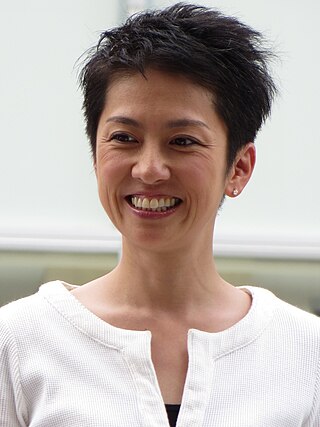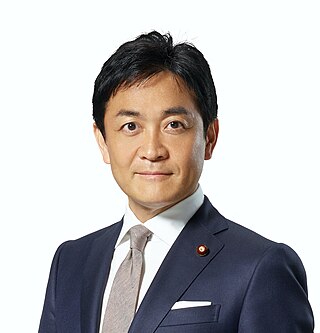
The politics of Japan are conducted in a framework of a dominant-party bicameral parliamentary representative democratic constitutional monarchy. A hereditary monarch, currently Emperor Naruhito, serves as head of state while the Prime Minister of Japan, currently Shigeru Ishiba since 2024, serves as the elected head of government.

Naoto Kan is a Japanese former politician who served as Prime Minister of Japan and President of the Democratic Party of Japan (DPJ) from June 2010 to September 2011.

The Social Democratic Party is a political party in Japan that was established in 1996. Since its reformation and name change in 1996, it has advocated pacifism and defined itself as a social-democratic party. It was previously known as the Japan Socialist Party.

Seiji Maehara is a Japanese politician who has been a member of the House of Representatives of Japan since 1993. He founded and led the political party, Free Education for All, before its merger into Nippon Ishin no Kai on 3 October 2024.

Tamayo Marukawa is a Japanese politician and former announcer of TV Asahi, who served as a member of the House of Councillors from 2007 to 2024. She is a member of the Liberal Democratic Party. She served as the head of the Women's Affairs Office of the LDP in October 2009.

Akira Nagatsuma is a Japanese politician of the Constitutional Democratic Party of Japan (CDP), a member of House of Representatives in the Diet. Nagatsuma is currently the deputy leader and the head of the Tokyo chapter of the CDP. He had served as the Minister of Health, Labour and Welfare in the Hatoyama and Kan administration. He came to prominence when he reported missing records of public pension plans. A native of Nerima, Tokyo and graduate of Keio University, he was elected for the first time in 2000 after unsuccessful runs in 1995 and 1996.

Yukio Edano is a Japanese politician who served as the leader of the Constitutional Democratic Party of Japan from its formation in 2017 until 2021.

Junya Ogawa is a Japanese politician of the Constitutional Democratic Party, and a member of the House of Representatives in the Diet. A native of Takamatsu, Kagawa and graduate of the University of Tokyo, he joined the Ministry of Home Affairs in 1994. Leaving the ministry in 2003, he ran unsuccessfully for the House of Representatives in the same year. Two years later, he ran again and lost for a second time. He ran for a third time in 2009 and was elected for Kagawa 1st district.

Kohei Otsuka is a Japanese politician. He was a former leader of the Democratic Party for the People (DPP) and the Democratic Party (DP). A native of Nagoya, Aichi, he attended Waseda University and received a Ph.D. in fiscal and monetary policies and reforms. Afterwards, he worked at the Bank of Japan from 1983 to 2000 before being elected to the House of Councillors for the first time in 2001.

Hisashi Tokunaga is a Japanese politician who is a member of the House of Representatives in the National Diet. A graduate of Waseda University, he was elected to the House of Councillors for the first time in 2007 after serving in the assembly of Shiga Prefecture.

House of Councillors elections were held in Japan on July 11, 2010. In the previous elections in 2007 the Liberal Democratic Party (LDP) had lost its majority to the Democratic Party (DPJ), which managed to gain the largest margin since its formation in 1996. The House of Councillors is elected by halves to six-year terms. The seats up for election in 2010 were last contested in the 2004 election.

The 2011 Democratic Party of Japan leadership election took place on August 29, 2011. The election chose Yoshihiko Noda as the successor to Naoto Kan as president of the Democratic Party (Minshutō) of Japan. The designation of the new party president as prime minister in the Diet took place on August 30; Kan remained as acting prime minister until his successor's formal appointment ceremony with the Emperor. In June 2011, Kan had announced to resign once three conditions have been met: passage of the second extra budget for fiscal 2011, passage of a bill to promote the use renewable energy and passage of a bill to issue new debt covering bonds. The extra budget was passed in July; after an agreement with the opposition was struck on reforming the child allowance introduced by the Democratic Party, the renewable energies bill and the bond ceiling increase passed through the Diet on August 26, 2011.

Banri Kaieda is a Japanese politician who is serving as the Vice Speaker of the House of Representatives of Japan since 2021. A member of the House of Representatives of Japan, he also served as the President of the Democratic Party of Japan between 2012 and 2014. He is a former minister in the Kan cabinet.

General elections were held in Japan on 22 October 2017. Voting took place in all Representatives constituencies of Japan – 289 single-member districts and eleven proportional blocks – in order to appoint all 465 members of the House of Representatives, the lower house of the then 707-member bicameral National Diet of Japan. Incumbent Prime Minister Shinzō Abe's governing coalition of the Liberal Democratic Party (LDP) and the Komeito party retained their seats in signs of what was perceived as weak opposition. Abe won his fourth term in office and held on to the two-thirds supermajority in order to implement policies on revising the war-renouncing Article 9 of the Japanese Constitution.
The Democratic Party, was a political party in Japan. It was the largest opposition political party in Japan from 2016 until its marginalization in the House of Representatives in 2017. The party was founded on 27 March 2016 from the merger of the Democratic Party of Japan and the Japan Innovation Party. The majority of the party split on 28 September 2017, before the 2017 general election. Many of its members contesting the election as candidates for the Party of Hope, Constitutional Democratic Party of Japan or as party members without nomination. On 7 May 2018 the DP merged with the Party of Hope to form the Democratic Party For the People.

The 2016 Democratic Party leadership election was held on 15 September 2016. It was the party's first election since the formation of the party from the merger of the Democratic Party of Japan and the Japan Innovation Party. The race determined the successor of acting president Katsuya Okada who decided against running for a full term.

General elections were held in Japan on 31 October 2021, as required by the constitution. Voting took place in all constituencies in order to elect members to the House of Representatives, the lower house of the National Diet. As the constitution requires the cabinet to resign in the first Diet session after a general election, the elections will also lead to a new election for Prime Minister in the Diet, and the appointment of a new cabinet, although ministers may be re-appointed. The election was the first general election of the Reiwa era.

Yuichiro Tamaki is a Japanese politician and the leader of the Democratic Party For the People (DPFP). He is a member of the House of Representatives, and a former leader of Kibō no Tō. Before joining Kibō, Tamaki was a member of the Democratic Party.

The Democratic Party For the People, abbreviated to DPFP or DPP, is a centre to centre-right, conservative and populist political party in Japan. The party was formed on 7 May 2018 from the merger of the Democratic Party and Kibō no Tō. In September 2020, the majority of the party reached an agreement to merge with the Constitutional Democratic Party of Japan and the original party was officially dissolved on 11 September 2020. However, 14 DPFP members refused to merge, including party leader Yuichiro Tamaki, and instead formed a new party retaining the DPFP name and branding.

House of Councillors elections were held in Japan on 10 July 2022 to elect 125 of the 248 members of the upper house of the National Diet, for a term of six years. The elected candidate with the fewest votes in the Kanagawa prefectural district will serve for three years, as the district combined its regular and byelections.


















